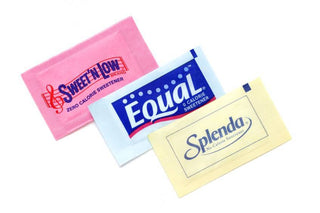Sometimes, you just need something sweet. Whether it’s for your morning coffee, in your diet soda, or for “better-for-you” home-baked goods, who hasn’t tried a sugar-free sweetener in the name of health or weight loss?
But what if your efforts to reduce your sugar intake were actually making you fatter? What if you are doing more harm than good by using artificial sweeteners?
A new study by researchers at Israel’s Weizmann Institute of Science, published in the journal Nature, suggests that artificial sweeteners raise blood sugar levels and promote metabolic syndrome by modifying gut bacteria.
“Results showed that those who ate and drank foods with artificial sweeteners had a different gut bacterial makeup than those who did not.”
The researchers fed one group of mice drinking water with the artificial sweeteners saccharin, sucralose, or aspartame added to it, and they fed another group of mice drinking water with sugar added to it. The mice were also fed either a normal diet or high-fat diet.
They then compared the two groups’ blood sugar levels, and shockingly, they found that the mice given water with artificial sweeteners had higher blood sugar levels than those given sugar water, regardless of the type of diet they were fed. Blood sugar levels returned to normal once the mice fed artificial sweeteners were given antibiotics to kill their gut bacteria.
The researchers later transferred feces from the artificial sweetener-fed mice into mice not exposed to sweeteners and found their blood sugar levels rose as well.
The scientists also examined the mix of gut bacteria after feeding mice saccharin laced water for 11 weeks. Compared with mice drinking regular water, the mice drinking the artificially sweetened water had distinct changes in their gut microbiota. The gut bacteria shifted to types that are more efficient in extracting calories from the food eaten (increased energy harvest) and are associated with obesity.
Researchers also examined the effects of artificial sweeteners in humans by studying 381 non-diabetic individuals. Results showed that those who ate and drank foods with artificial sweeteners had a different gut bacterial makeup than those who did not. Additionally, those who consumed artificial sweeteners had higher fasting blood sugar levels and a condition called impaired blood-sugar tolerance, a precursor to developing type 2 diabetes.
For the final part of the study, researchers studied seven volunteers – five men and two women – for one week. The volunteers, who did not usually consume foods with artificial sweeteners, were given the FDA’s maximum acceptable daily amount of saccharin on days two through seven. Researchers monitored the volunteers each day and recorded their blood sugar levels.
At the end of the week, more than half of the volunteers (four persons) experienced elevated blood sugar. And when the feces of the humans with elevated blood sugar was transferred into mice, they, too, saw a rise in blood sugar. In those participants who experienced altered blood sugar management, their gut bacteria also changed in response to using artificial sweeteners.
Study author Dr. Eran Elinav at Weizmann’s Department of Immunology noted, “Our relationship with our own individual mix of gut bacteria is a huge factor in determining how the food we eat affects us. Especially intriguing is the link between use of artificial sweeteners – through the bacteria in our guts – to a tendency to develop the very disorders they were designed to prevent; this calls for reassessment of today’s massive, unsupervised consumption of these substances.”
The Bottom Line
While the use of artificial sweeteners hastening the development of glucose intolerance and metabolic disease is not novel, the mechanism of action – which is caused by the change in the composition and function of the gut microbiota – is a new and compelling finding.
But this study isn’t an endorsement for food or drinks high in sugar in place of those with artificial sweeteners. It does, however, suggest that we need to look more carefully at how the foods we eat affect our gut bacteria, and in turn, our health and weight.
I personally don’t use artificial sweeteners, as I don’t like their taste or aftertaste. Just like I don’t buy low-calorie or fat-free processed foods, I don’t consume artificial sweeteners. I typically use honey to sweeten my tea or coffee.
But while honey has a more positive health halo, from a metabolic standpoint (the rise in blood sugar followed by eating a food containing glucose), the effect is about the same. And while we’re on the subject, agave syrup is actually worse than ordinary table sugar or high fructose corn syrup.
Based on this new information, it would seem prudent to cut way back on or discontinue the use of artificial sweeteners. We’re not recommending that you replace your daily Sweet ‘N Low with sugar. Instead, try shifting your palate from an overreliance on sweet, sugary tasting foods.
If you want to sweeten a beverage or food, sprinkle on a bit or sugar or use a small teaspoon of honey. Or, use a natural sugar alternative like stevia (rebiana, PureVia, or Truvia), monkfruit extract (Monkfruit in the Raw, Nectresse), or sugar alcohols (sorbitol, xylitol, mannitol), in moderation, of course.
And though the number one source of added sugars might be sweetened beverages like soft drinks, but many foods like bread contain hidden sugar. Read labels to be sure (and to be shocked).
Need some guidelines to help keep you on track? The American Heart Association recommends that most American women should not eat or drink more than 100 calories or 6 teaspoons per day from added sugars. Most American men should not eat or drink more than 150 calories or 9 teaspoons per day from added sugars.
Remember, the food we feed ourselves also feeds our gut bacteria. Make good choices for you and your gut, and you’ll more than likely see a big impact on your health and weight!
Note: Brand names for aspartame

